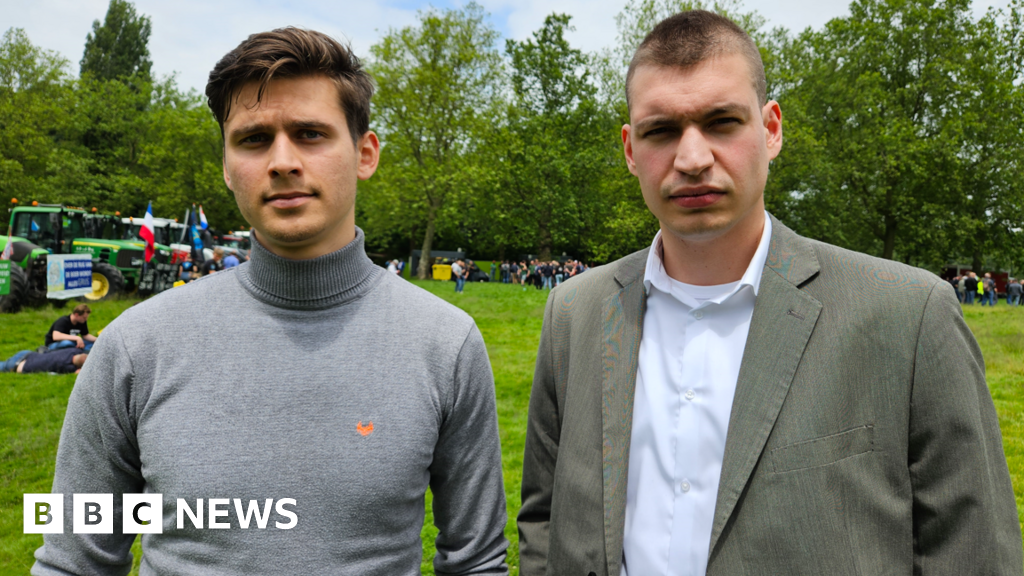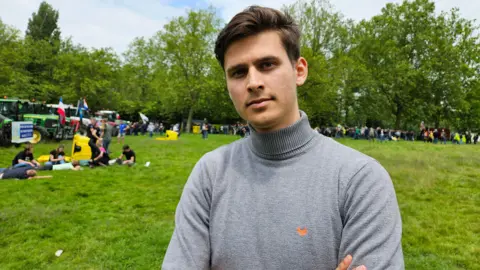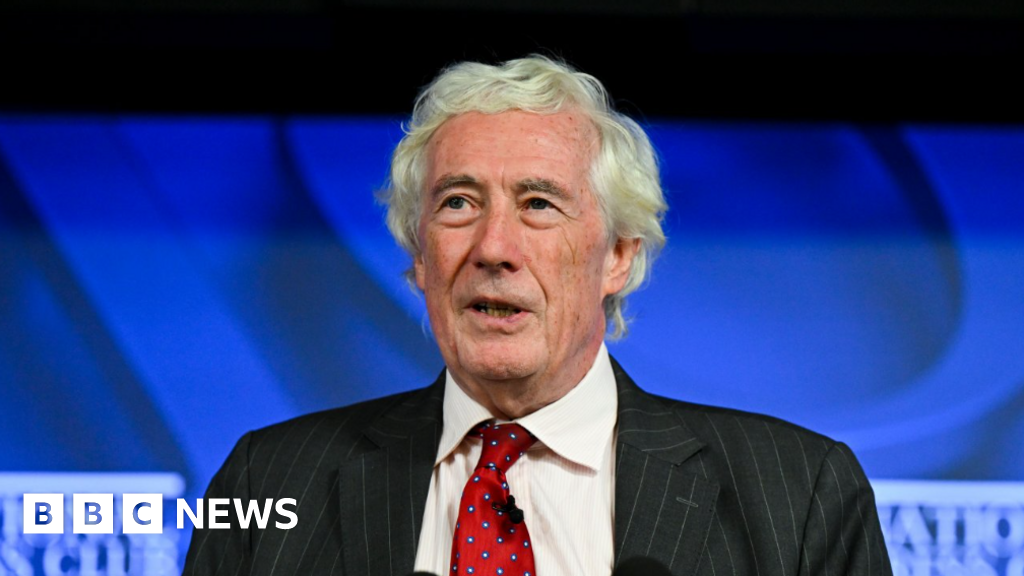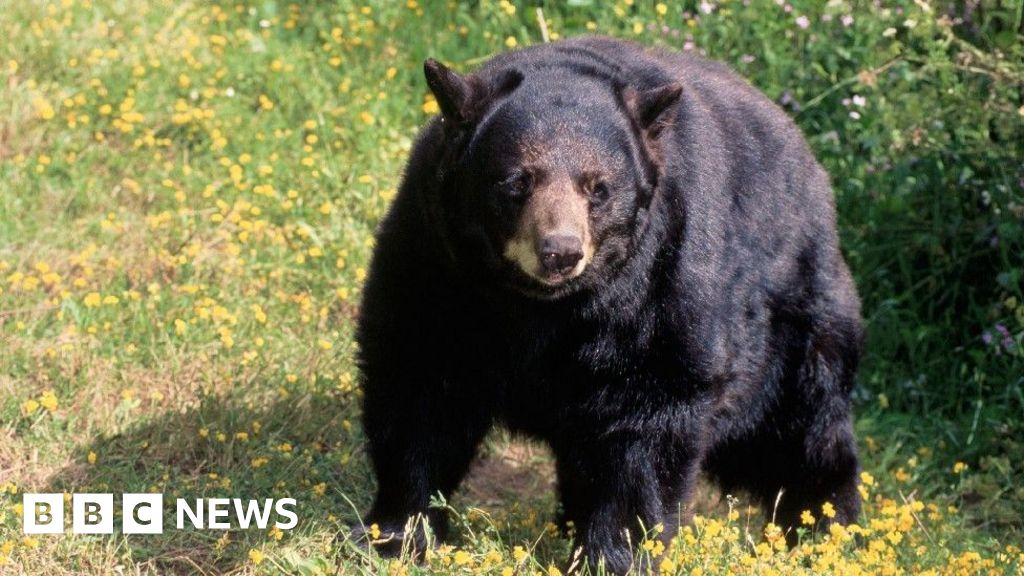
 BBC
BBCAs Europeans head to the polls in four days of voting across 27 countries to elect a new European Parliament, millions of young people will be casting their ballot for the first time.
In some countries, the voting age has been lowered to 16 – so minors in Belgium, Germany, Austria, Greece and Malta will be able to cast their vote in these elections.
“It’s a very big opportunity for us, because it gives us a voice we never had before,” says Mare Verlinde, a 17-year-old student from Belgium.
“I think Europe needs to step up and be stronger – we can’t always rely on Nato,” her friend Auguste Duchene says, earnestly.
For this group of friends – and for many of their peers – these European elections are hugely significant when it comes to security. They grew up being told Europe was safe – but in the last two years, that conviction has disappeared.
17-year-old Lore Sleeckx is worried about war in Europe.
“My history teachers are saying they wouldn’t be surprised if a world war happened in the future,” she says – and all her friends nod in agreement. “That really scares me.”

In the 2019 European elections, young people turned out in record numbers – their votes going overwhelmingly to green parties that championed strong climate policies. At the time, it was heralded as a “Green wave.”
But five years is a long time in politics.
If the polls are right, an unprecedented number of young voters are considering casting their votes for parties on the right and far right, many of which are broadly Eurosceptic.
“We want to do away with the status quo, and that’s why many of my friends are voting for the right,” Bence Szabó tells me, while attending an anti-EU farmers protest in Brussels. The rumbling sound of the tractors blends with the voices on stage as they denounce Europe’s elites.
“Everything coming from the right is being demonised,” says the 25-year-old from Hungary, “but we can actually solve the issues that the left tried to solve – and failed.”

The issues that young Europeans care about, of course, vary. But this is a generation that grew up during the Covid pandemic, and now feels worried on multiple fronts: war in Europe, climate change, an uncertain job market and a lack of affordable housing.
“We are not extremists. We are just angry,” explains Lazar Potrebic, a 25-year-old from a Hungarian minority in Serbia who is entitled to vote.
He – and many of his peers – are worried about the future, and feel that the more traditional parties are not listening to their concerns.
“We feel like our needs are not being met. People our age are taking really important life steps. We’re getting our first jobs, thinking about starting a family…but if you look around Europe, rent prices are going through the roof – and it’s hard to get work.”

Of course the feeling of not being listened to when you’re young, of not being part of the equation, is nothing new. But many of the parties on the far right are actively courting the young vote, says Dave Sinardet, a professor of political science at the Free University of Brussels.
“The radical right channels anti-establishment feelings,” he told the BBC. “They have a bit of a rebellious vibe – especially when it comes to their anti-woke agenda – and that appeals to young people.”
For the leader of Spain’s Vox party, Santiago Abascal, the hot-button issues are transgender rights and abortion.
Migration is another question driving young voters to the right. Last year saw some 380,000 people illegally crossing the EU’s borders – the highest number since 2016.
“The EU’s stance on migration has been too lenient,” believes Giorgio, a 28-year-old Italian. He will be voting for Giorgia Meloni’s Brothers of Italy – arguably the far right’s biggest success story in Europe.
He thinks the EU should have a migration policy more similar to that of Hungary, Slovakia and Poland, which have all challenged the EU’s new migration pact which gives dissenting countries the right to pay rather than receive new arrivals.
 TikTok
TikTok“They were mercilessly criticised when they built fences; but the reality is that what the EU is doing is not working,” says Giorgio. “We have no idea who is coming in: people are falling through the cracks, and they could have a criminal record – meaning that Europe is less secure.”
Far-right politicians are also doing a better job at grabbing the youth’s attention online: their social media strategy is unmatched.
The perfect example is French politician Jordan Bardella – the charismatic 28-year-old leader of the National Rally who heads its list for the European elections. With 1.2m followers on TikTok, he is making his party appealing to France’s youth – one selfie video at a time. According to one survey, 36% of French people under 24 back him.
“TikTok and Instagram lend themselves to the type of messages that the radical right wants to spread,” says Dave Sinardet. “Simplistic, unnuanced videos on issues like migration, security and gender.”
In Italy, Matteo Salvini of the far-right League is campaigning on Instagram with the slogan “Less Europe, more Italy”. He posts AI-generated images suggesting that “more Europe” means being forced to eat insects, men with Jesus-like beards giving birth, and the unforgivable sin of eating pineapple on pizza.
“These messages ignite an emotional response, and that’s why they are boosted by the algorithm, especially on TikTok,” says Prof Sinardet. “The far right invested on social media very early on – and now, they are reaping the rewards.”
More than six in ten young EU citizens say they are going to vote in the upcoming European elections. Instead of a “green wave”, this time around they could be pivotal in delivering the most significant push to right since the EU was founded.
That could fundamentally reshape Europe’s agenda on issues ranging from climate, to migration, to support for Ukraine.
Bence Szabó from Hungary has no doubt this will translate into an EU legislature more in tune with the young generation.
At least, that’s their promise on TikTok.



